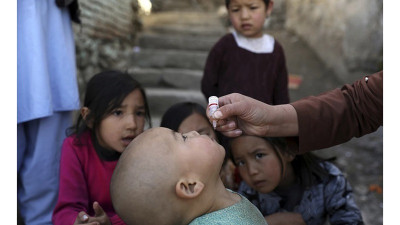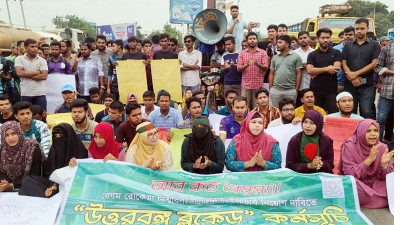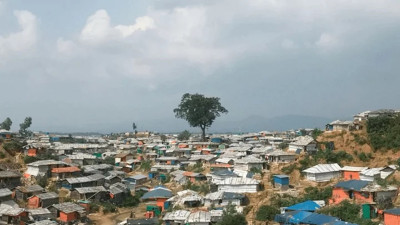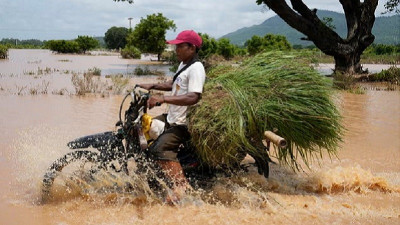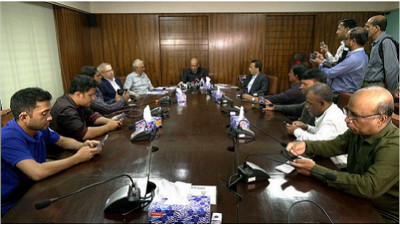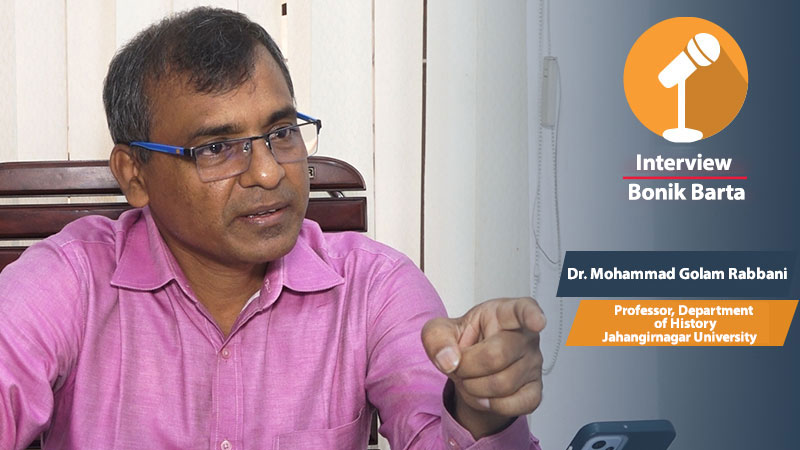 Photo: Bonik Barta
Photo: Bonik Barta The protests and clashes surrounding the quota reform movement
have plunged the country into unrest. Over two hundred people have lost their
lives in the turmoil. A curfew remains in effect nationwide, and law
enforcement agencies are actively deployed. Amid the ongoing demonstrations,
there have been clashes between police and protesters, resulting in numerous
arrests. Teachers, in solidarity with the students who initiated the movement,
are also participating in various activities. Among these activities, a leading
university teacher has given an interview.
Dr Mohammad Golam Rabbani is a professor in the Department of
History at Jahangirnagar University (JU). He is an independently elected member
of the university's Senate. In 2020, he completed his PhD in International
Studies from Jawaharlal Nehru University (JNU) in New Delhi, India. He
discussed the current situation in the country related to the quota reform movement
in an interview with Bonik Barta on Wednesday (July 31). The interview was
conducted by Dedarul Hoque.
The quota reform movement was initially peaceful. But why did it turn violent?
The quota reform movement started peacefully on the university
campuses. However, at a certain point, it turned violent. There are several
reasons behind this shift to violence. People may interpret these reasons in
different ways, but from my perspective, a few key factors stand out. We need
to remember that the movement is led by students who are in a highly emotional
age group. Their beliefs and thoughts are very transparent. Consequently, there
is not much difference between what they believe and what they express. They
articulate their beliefs with full conviction. The government failed to handle
this movement in a tolerant and neutral manner. In this regard, the government
has been unsuccessful.
How could it have been handled? Where did the mistakes occur?
If we look at our families, whom do we listen to most attentively?
We pay special attention to the younger members of the family, especially
children and teenagers. Similarly, in a country with nearly 180 million people,
the government should prioritize the students. Students need to be handled with
flexibility in any situation; they cannot be controlled by fear or threats. In
my view, the government made a policy error in this regard.
Regarding the press conference that took place after the Prime
Minister returned from China, I want to address the questions posed by two or
three journalists. These questions should be part of the discussion. The
responses given by the Prime Minister, based on the specific questions from a
few journalists, did not seem appropriate for a Prime Minister. If he had
addressed the students with care and affection, the situation might have been
different.
We teach the history of the Liberation War, even in rural
schools and colleges. When the government sends a wrong message about the
history of the Liberation War—particularly concerning freedom fighters and
their adversaries—it becomes very damaging. A significant mistake has occurred
here.
When the issue of quota reform arose, the Prime Minister could
have responded by saying that the students' demands would be taken seriously
and that a swift commission would be formed to address the matter.
Additionally, the quota reform movement is not new; there was a similar
movement in 2018. As a teacher, I personally supported this movement because
the students did not demand the abolition of quotas. Both in 2018 and 2024,
they called for the reform of quotas.
As an educator, I believe in the necessity of quota reform.
However, the government's stance towards the students seemed biased. The head
of a country's executive branch should not speak from a partisan perspective
but should maintain neutrality. Moreover, why should the Prime Minister be
directly involved in every detail? The government should handle these matters.
In any crisis, a leader should speak in a way that ensures policymakers and
administrators take the issue seriously. If the government had behaved this
way, the students might not have become so agitated. However, a lack of
foresight from the government has been evident in this regard.
Subsequently, a responsible government minister gave an implicit
signal to suppress the movement, which also contributed to the violence. The
violence then spread, initially starting at Dhaka University. We are all aware
of what happened there. It later spread to Jahangirnagar University, which has
become a crucial focal point of the movement. On the afternoon of July 16,
clashes occurred at the university, resulting in many injuries. Subsequently,
nearly two to three hundred protesting students went to the Vice-Chancellor's
residence seeking protection. However, the university administration failed to
provide that security. There were questions about the administration's
willingness to ensure the students' safety. Personally, I went to the
Vice-Chancellor's residence and spoke with him, as well as with the Pro-Vice-Chancellor
and the Proctor, repeatedly requesting them to ensure the students' safety.
Despite these efforts, there was a lack of response. Ultimately, the students
did not receive protection, and outsiders attacked them inside the
Vice-Chancellor's residence. The Vice-Chancellor and his administration acted
as passive spectators. This is also a significant reason for the spread of
violence to other universities.
The unprecedented attack by outsiders on the students taking
refuge at the Vice-Chancellor's residence should not be confined to
Jahangirnagar University alone. Dhaka University is the largest educational
institution in the country, followed by Jahangirnagar University—students from
ordinary families across the country study in these institutions. Therefore,
closing the dormitories at Dhaka and Jahangirnagar Universities and allowing
police or others to mistreat students would naturally cause nationwide concern.
This represents a major error on the part of the government.
What role should the government have played in response to the loss of so many lives?
In the face of such a significant event, widespread violence,
and loss of life, has anyone at any level of the government acknowledged
responsibility? Responsibility must be accepted, and the mindset of denial
needs to change. The government has tried to prove through the discussions that
various groups were responsible for the violence, citing different explanations
at different times. Where is the government's failure? Regardless of who committed
the violence, violence occurred. The government failed to control it. This
needs to be acknowledged. To this day, no level of the government has accepted
responsibility. Those responsible for each act of murder must be brought to
justice. Blaming the protesting students for everything is unacceptable. The
people of this country will never accept that. Especially given that violence
spread to educational institutions, leading to nationwide unrest and loss of
life. Shouldn't the responsible ministers take accountability? Isn't there a
responsibility for the administration here? In other countries, individuals in
positions of responsibility resign or are removed when such incidents occur.
Nothing like this has happened in our country. Even if it had, it might have
somewhat mitigated public outrage. The current situation highlights the lack of
professionalism among those working in the administration. There must now be a
focus on restoring professionalism.
Attempting to suppress the movement by attacking students at
Dhaka and Jahangirnagar Universities was a grave mistake. The consequences of
that action are well-known. Following that, students from both public and
private universities across the country took to the streets. Even then, the
government failed to manage the movement in a tolerant manner. Furthermore, on
the day the Prime Minister addressed the nation, if he had said, "Go home,
I will take responsibility," it might have made a difference. However, she
did not do that. Her statement did not address the concerns of the ordinary
students. The students' anger was never mitigated.
Are the students only angry about the quota reform movement?
Are the students only upset about the quota reform movement?
That is not the case. If we look at the state of the education system in
Bangladesh over the past decade or two, and the situation in the job
market—which is very dire—with unemployment on the one hand and the lack of
production of scientists, engineers, or creative individuals on the other, the
situation is troubling. There is no respect for professional people in the
country. Respect and benefits are reserved only for those who work in the
administration. As a result, our students are being misled. They no longer
dream of becoming doctors, scientists, or engineers. Many engineers or doctors
are taking the BCS exam, while engineers from China or Japan are building
projects like the Padma Bridge or the metro rail in the country. Our engineers
are studying BCS guides and taking the BCS exam. Why does an engineer who
graduates from BUET want to join the administration through the BCS exam? Why
does a doctor, despite their medical qualification, want to join the foreign
service or administrative cadre through the BCS exam? It is because they do not
receive respect as doctors. Identifying these issues is crucial.
All students are being directed toward the BCS exam. Just a few
days before this movement, there was alarming information about the leaking of
questions by the Public Service Commission (PSC). What has the government's
response been to this? The Prime Minister needed to take strong action on this
issue. However, no one at any level of the government has taken responsibility.
No measures have been taken to date. It is necessary to identify where the
students' frustration is coming from. The only dream for students is the BCS
exam, which is plagued by 56 percent quota and PSC corruption. Has the
government identified this source of frustration among the students? It has
not. If the issues are not identified or addressed, the problems will persist.
Reports of large-scale corruption, embezzlement, and money laundering have
emerged, often involving individuals connected to the ruling party or
administration. What actions has the government taken on these matters? These
issues have also fueled the movement.
Is it possible to control students through suppression and repression?
If suppression and repression are chosen instead of addressing
the problems, the students' movement or discontent cannot be alleviated. These
issues have only intensified the movement. When the movement faced attacks,
everyone was aware of how ordinary students responded. I believe the government
has failed in this regard.
Why are we unable to develop skilled human resources?
The country faces an employment problem. It is important to
assess how effectively the government has addressed this issue. In a densely
populated country, we cannot solve this problem overnight. Some employment
challenges will inevitably remain. However, what matters is how the government
strives to create jobs that are competent and sincerity based on reality.
Has a permanent system been established in the government for
exporting skilled labor? How are those who want to go abroad being deceived,
and in what ways? Has the government managed to send people to Malaysia? It has
not. At present, we are rich in human resources, but is there a plan to utilize
this resource effectively? Meanwhile, the opportunity for a demographic
dividend is running out. Have we researched how other countries are benefiting
from their demographic dividend? We have not.
At the village level, students have been overly politicized to
the extent that their dreams now revolve around being associated with a
political party. They are prioritizing party activities over their studies.
Here, too, they are being misled. If this process continues, not only will we
fail to create skilled human resources, but we will also be unable to hope for
a bright future for the country.
Why have others joined the students' movement?
Is this movement still a student movement? It has now become a
student-public movement. Many participants in the movement are not students. In
the hotspots of the Dhaka city protests, there are impoverished people,
including the very poor and children. Why? These questions need to be raised.
The country has seen development, but has corruption been
eradicated? No, it hasn't. The government is promoting development, and while
the implementation of mega projects like the metro rail and the Padma Bridge is
commendable, the fight against corruption has failed. Employment opportunities
have not been created, and despite economic growth, actual development has not
occurred. For true development, growth must be accompanied by equitable
distribution, a focus the government has never maintained.
Is there any government control over the market? No. How do
ordinary people manage to survive? The government cannot remain preoccupied
with mega projects alone. Issues such as the minimum relationship between income
and expenditure need attention. With high inflation, low-income people are
struggling to buy essential goods, but the government is indifferent. As a
result, there is accumulated frustration among these people, which may have
manifested in this movement.
Over two hundred people, including children and teenagers, have
been killed in the movement across the country. How do you view this situation?
Each murder must be thoroughly investigated and judged. It is
essential to ensure that no politics interferes with the investigation and
prosecution of these killings. How this will be done is the government's
responsibility. Those involved in each murder, regardless of who they are, must
face justice. If the government wants to, it can make it happen. It depends on
the government's willingness. In the current situation, the government's
willingness has not yet been evident. An independent commission could be
established, but first, public trust needs to be restored.
What is your opinion on mass arrests and harassment?
In a free country, mass arrests are unacceptable in any form. In
a democratic system, mass arrests cannot continue.
You have seen that Arif Sohel, the coordinator of the quota
reform movement at Jahangirnagar University, was taken away without any reason.
Six others were also taken. The most alarming issue is that people are being
taken away in plain clothes, and their families cannot determine if they are
indeed members of law enforcement agencies. Even criminals could come and claim
to be members of the law enforcement agencies. The climate of terror created
must be stopped immediately. Arson and vandalism have occurred in government
buildings—those involved must be identified through proper legal procedures.
The people of this country want that. The people of this country cannot accept
that those who committed arson and vandalism go unpunished. Instead, ordinary
students are being arrested, and this must be stopped immediately.
Educational institutions have been closed indefinitely. What
should be done at this moment? What should be the government's first step?
The educational institutions are in a state of paralysis, which
is very concerning for us. There is a level of instability and paralysis at
every level of education. What is being done about the curriculum at the school
and college levels? I was involved in reviewing a book for the new curriculum,
and the situation there is dire. I am not discussing that right now. University
teachers are staging a protest. The Prime Minister could have directly invited
university teachers to discuss their issues, but she did not. Instead of
addressing the protest, the entire teaching community has been disregarded.
Moreover, all educational institutions have been closed for a while due to the
quota reform movement. Can you imagine the extent of the damage? Restoring
public trust, rebuilding trust among teachers and students, and creating a
peaceful environment are crucial. Educational institutions must be reopened as
soon as possible. I reiterate that it is not possible to restore normalcy in
the country while keeping educational institutions closed. Dialogue must be
opened, and an environment of trust must be created.
Currently, teachers are also joining the students' movement.
What is the reason for this?
After the Supreme Court's ruling, the matter of quotas was
settled. At the time of publishing the relevant gazette, two government
ministers had promised that no student involved in the movement would face
administrative or academic harassment. As a teacher, I was also reassured by
this promise. But what did we actually see?

